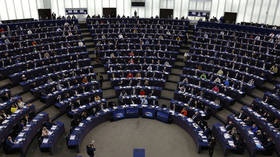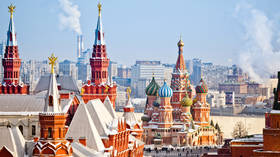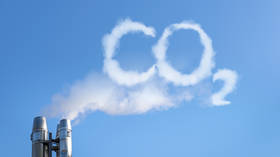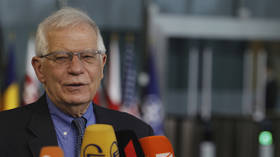The price of politics: What will happen if the West really abandons Russian gas?
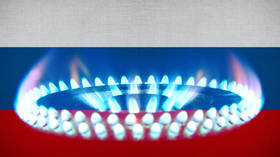
On April 2, Lithuania became the first EU country to declare that it was completely abandoning Russian gas. The announcement was made amidst Moscow's ongoing military assault in Ukraine and came after the Kremlin announced a new payment procedure for countries deemed “unfriendly."
Under the new rules, importers from the EU will have to open a ruble account at Gazprombank, and lodge payments there. Moscow says the measure is needed because it can no longer trust the euro and dollar, due to sanctions.
At the same time, there is no unified position in the European Union on whether it is realistic to impose a full embargo on Russian gas imports that would cover all countries of the bloc. Poland claims it's ready to follow Lithuania’s path. Its government representative on strategic energy and infrastructure issues, Peter Naimsky, has already announced that Warsaw will stop buying gas from Russia after 2022.
However, landlocked Slovakia and the Czech Republic are apparently not ready to take such drastic measures. The head of the Slovak Ministry of Economy, Richard Sulik, said his country can’t do without Russian gas supplies, so Moscow’s condition for payment in rubles must be respected. He noted that Slovakia buys about 85% of the gas it needs from the Russian Federation, and, even with gas supply diversification, it will take several years before it can stop buying Russian gas.
“We cannot be cut off from gas,” the Slovak minister said bluntly. Prague has also admitted that its gas reserves would last a maximum of 34 days.
France and Germany have taken a position somewhere in between – Germany’s Finance Ministry gave assurances that a plan was being jointly worked out to prepare for a possible termination of Russian gas supplies. But Chancellor Olaf Scholz admitted the obvious, stating that, while Germany will “probably eliminate” its dependence on Russian oil and coal within a year, this won’t include gas imports.
“This is not a game, but a scenario that needs to be taken very seriously, as it can potentially create deep divisions in the economy and society. From my point of view, it was correct not to immediately start the process of terminating relations with respect to supplies,” German Vice Chancellor Robert Habeck said, explaining the consequences for his country.
RT asked experts what a sudden termination of gas supplies from Russia might actually mean for the EU.
EU won’t freeze until it gets cold
The bloc consumes a total of 400 billion m3 of gas per year, about 40-45%, or 150 billion m3, of which is supplied by Russia. But the dependence here can be called mutual. In 2021, Russia exported 200 billion m3 of gas, of which 75% went to the EU.
Experts agree that if gas supplies are stopped now, Western European countries will face very harsh consequences in late summer or early autumn. This is because now, at the beginning of April, the current heating season is just coming to an end, and any current needs can be fulfilled by stocks already in storage facilities.
Marcel Salikhov, director of economics at the Higher School of Economics’ Institute of Energy and Finance, told RT that gas consumption strongly fluctuates depending on the season.
“During the heating season, autumn and winter, gas consumption sharply rises everywhere in Russia and the EU. But now demand for gas is falling. And if we hypothetically imagine that gas supplies stopped immediately, the EU would be able to survive until the end of summer or early autumn due to its own production and the import of liquefied natural gas (LNG). But the problem is that gas will not be pumped into storage facilities during this time, and the question will arise about what to do at the beginning of the next heating season. Although the EU will have some time to intensively search for alternatives,” he said.
Under the current scheme, it is impossible for all EU countries to ensure heating in winter without Russian gas, according to Salikhov.
But individual countries, like Poland, can afford to forgo it. In 2022, the Baltic Pipe gas pipeline from Norway will be put into operation, and in theory, it will be able to supply the same 10 billion m3 of gas coming from Russia now. Though Norway is unlikely to be able to fill the pipeline at 100% capacity, Poland can close the deficit by buying LNG on the world market, as they already have an LNG receiving terminal in Swinoujscie.
Cold horror
Igor Yushkov, a leading expert at the National Energy Security Fund, said in a comment to RT that if the EU stops receiving Russian gas, “there will undoubtedly be a global energy crisis.”
He described one of the most unfavorable scenarios in which Russia will cut production.
“What would happen if Russia couldn’t supply pipeline gas to Europe and cut production by the same amount? After all, we cannot redirect this gas anywhere, and it’s impossible to reroute gas pipelines. If this huge volume simply left the market, all the remaining gas would become even scarcer and more expensive. In this regard, if a high-volume consumer like Poland refused to purchase our gas, the consequent reduction in production of the 10 billion m3 per year, which we would have otherwise supplied to them, would affect the spot markets in any case. And imagine if the whole 150 billion m3 vanished from the market... It would be a global crisis,” he said.
If Russian gas is largely abandoned, the EU may well face energy supply problems, as there will simply be nothing to produce electricity from, according to Yushkov. The situation could worsen further if, in response to the gas embargo, Russia stopped exporting coal to EU countries, as it accounts for 70% of their supply. In that case, the energy sector would have to be managed “manually,” according to Yushkov.
“There may no longer be any trading on the spot market [a market with short-term contracts, where assets are traded and delivered immediately at actual current prices]. Trade in greenhouse gas emission quotas would be suspended and forgotten for a long, long time. All possible nuclear power capacity (for example, German nuclear power plants) would be restored. Electricity would be supplied by the hour. It would be extremely difficult to prepare for the next heating season. It would be necessary to economize on gas, prohibit the use of air conditioners, and supply electricity by the hour. Apartments would not be heated to 22°C, but to 10-15°C. It would be necessary to provide heat at least to the population and public facilities, like schools, nursery schools, and so on,” he said, describing the potential situation.
“But all the same, this would not be enough to replace the volumes that Russia supplied. Especially if Russia suddenly stops supplying coal as well. There is no excess gas on the world market, so there is nothing to replace our supply with. For example, production is declining in the North Sea because the deposits have been depleted, plus no one has made investments there for years. Therefore, the situation is very difficult for the Europeans,” Yushkov said.
In fact, in February 2022, Norway’s largest gas producer, Equinox, announced that it would be unable to provide additional fuel supplies to the EU if imports from Russia ceased.
In the industrial sector, energy would become physically scarce, and the goods produced would be “very, very expensive” and uncompetitive compared to their Asian and American counterparts.
Alternative for Europe
Despite the fact that the EU is trying to speed up the process of foregoing Russian gas, experts agree that these plans are unrealistic for the near future.
“The EU now has a plan to reduce dependence on Russian gas that provides for a two-thirds reduction in purchases of Russian gas in 2022. In my opinion, this is unrealistic. While it is quite possible to reduce imports from Russia by 20% this year, options for replacing it just don’t exist. So, measures are proposed both from the demand side, like imposing various limits, and the supply side, which include generating more electricity from coal, abandoning plans to decommission nuclear power plants, and importing additional gas, primarily American and Qatari LNG,” Salikhov explained.
Suren Kazaryan, a senior consultant from the Big4 consulting firm, agrees. In a comment to RT, he stated that, if the bloc refuses to buy Russian gas, it will inevitably be highly dependent on US LNG and their strategic energy reserves. “As a result, the EU will simply replace a cheap adjoining pipeline with expensive tankers from the other side of the world.”
For European industries that use gas as their main raw material, there is simply no alternative to gas right now, he said. “Changing production chains and putting everything on rails using LNG is not a matter of one or two years. New equipment, storage facilities, and production sequences are necessary, all of which are colossally difficult and resource-intensive.”
Kazaryan sees two options for how events may unfold in the next five years in the event of a complete EU embargo on natural gas from Russia – neutral, “with optimistic utopian overtones,” and pessimistic.
In the first scenario, the EU will accelerate its transition to green energy sources and begin to direct all funds in this direction in order to partially reduce consumption of natural gas by the population and various public facilities by the end of 2022.
“This will make it possible to mitigate the losses from the embargo and give a powerful impetus to speeding up development of green energy. This can potentially lead to an influx of capital and investment and set a new trend that will allow Europe to remain a significant player in the political arena in the 21st century, which has already been dubbed ‘Asian’ in advance,” he said, describing the best-case scenario for the EU.
There are many ‘buts’ in this scenario, among which are the EU’s unwieldy bureaucratic decision-making processes, the above-mentioned disagreements among member states due to their varying relations with Russia and dependence on its gas, the difficulty of revising preapproved EU budgets, and lack of capacity.
“Green energy is good, but we should not forget that it isn’t possible to produce the needed amount of energy with current technology,” he believes.
The pessimistic scenario foresees a radical and fundamental transformation of the EU, where sharply higher unemployment rates due to industry shutdowns, as well as energy, food, and political crises, cannot be ruled out.
“And, of course, a manifold increase in energy costs due to the high cost of LNG and an inadequate supply of it. In addition, there is insufficient capacity and terminals for LNG storage and receipt in Central and Eastern Europe. There is one relatively large one in Lithuania (Klaipeda), but it will not be enough for all the Baltic countries,” he notes.
While the Lithuanian Ministry of Energy reported that the country can fully provide for itself through the Klaipeda LNG terminal commissioned in 2014, Prime Minister Ingrid Shimonite has warned that the terminal would not be sufficient to provide gas for all Baltic countries.
Despite reaching a long-term agreement with Qatar on energy cooperation in March 2022 that provides for the supply of LNG, Germany has a similar problem.
“This is definitely not a story for the coming year because there are no terminals in Germany capable of receiving Qatari LNG. Moreover, Doha can only supply about 15 billion m3, while supplies from Russia amount to about 60 billion m3,” Kazaryan said.
Two problems for Russia
An embargo on Russian gas would invariably hit the import economy. The main problem is that Russia doesn’t have enough developed infrastructure to compensate for the losses by redirecting its supply to other markets.
Salikhov says it will be harder for Russia to deal with this situation than the rejection of its oil.
“The EU is very dependent on Russian gas, but this also means that Russia is very dependent on the European market. There are very few alternatives in the current perspective, simply because our entire system of gas pipelines is directed to Europe, and it is impossible to reorient flows to other significant markets within the current gas transport system. There’s Turkey, but it already consumes a lot of Russian gas, and it won’t necessarily be prepared to increase purchases by much.
Asian countries may be ready to buy more, but the question is how. The only gas pipeline to the East now is the Power of Siberia to China, which is not physically connected to a unified gas supply system, so it is impossible to transfer the gas produced in Yamal to China through the extant gas pipeline system. This means that we need to quickly negotiate with China on a Power of Siberia-2. While the concept for this already exists, it is still at the design stage and no specific agreements have been reached,” he explains.
While Kazaryan notes that China’s appetite has grown since it abandoned coal due to environmental problems, and demand from India rises every year, he agrees that, at present, it is technically difficult to increase supplies to these countries. “It is possible to build additional lines, but only with China’s help. But then it will come to the market, pour money into Gazprom’s contractors, and start supervising construction projects itself.”
There are similar problems with LNG plants. There are only two large ones in Russia at the moment – on the Yamal Peninsula, where NOVATEK has a controlling stake, and on the Sakhalin Islands, where Gazprom has a controlling stake. According to Salikhov, they are already operating at full capacity, and it is impossible to increase exports from these facilities.
Both of these plants were built using foreign technology, which, apparently, will no longer be available to Russia. For example, Linde AG, a German company, has stopped working on new projects in Russia and intends to comply with the EU sanctions imposed on Moscow.
Yushkov admits that Russia has neither the technology nor the equipment to build high-capacity LNG plants.
“Shell has built on Sakhalin, and Yamal LNG was built based on American technology. The new Arctic LNG-2 plant is being built based on German Linde technology. Our main task is to develop this technology quickly. We can still build medium-capacity LNG plants [with capacities of up to 1 million tonnes per year – RT], albeit with difficulty, and then it’s easy to scale medium-capacity LNG plants so that large volumes are obtained. Then we will continue to export LNG from these plants in order to have flexibility in choosing sales markets,” he said, describing potential opportunities.
But in any of these scenarios, Russia will inevitably suffer tangible material losses since the reorientation of flows will take time. Salikhov notes that, even if construction of the Power of Siberia-2 started today, it will take about five years to complete.
“LNG plants also take five years to build. Yes, the price of gas will rise, but if you can’t export, what difference does it make to you?” Salikhov said.
“We would lose money anyway, and they would lose electricity and heating. This may not be equivalent, but we must admit that gas currently brings Russia a lot of money. Gazprom sold $9.5 billion worth of gas in January alone,” Yushkov said.
